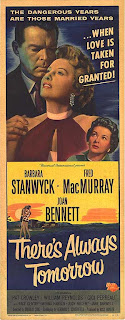[The following is my belated October entry for Blind Spots. I hope to catch up on last months and watch my final pick for the year on time.]
Clifford Groves (Fred MacMurray) has made a life of modest prosperity for himself. He has built a reasonably sized toy manufacturer from the ground up, offering him enough affluence to afford a nice house and a servant to help around it. Unlike Douglas Sirk’s “women’s pictures,” There’s Always Tomorrow remains with Cliff, who, in darkly amusing irony, is everything the husbands in those other melodramas is not. A decent, hard worker and a loving family man, Cliff is not the tyrant of his household but the ideal vision of the postwar American man. And yet, he exists in a prison as much the housewives who dot typical domestic dramas from the period, caged not by abuse but neglect, objectified not as a provider of care but of material sustenance.
Sirk inverts the usual dynamics of melodrama to tell Cliff’s story. The director wanted to shoot the movie in color but could not secure the money to do so. Nevertheless, Russell Metty’s black-and-white cinematography visualizes the different social pressures and archetypes at work on men. The emotive, visceral use of color is thus swapped for a kind of remove, denying Cliff an aesthetic outlet for his feelings to ensure he does not have any unmanly outbursts. Deep focus shots capture the vastness of the home’s interiors, and the cold space they create emphasizes how stark and dead the middle-class comfort around the man has become.
Most would say that the impetus for Cliff’s sudden reflection and dissatisfaction with his life comes when an old coworker, Norma (Barbara Stanwyck), knocks on his door one night. But the seeds of Cliff’s awakening are planted just before, by some show tickets he traverses through rain to acquire for his wife, Marion (Joan Bennett). Pleased with himself, Cliff returns home only for Marion to say she has to attend a recital and cannot back out of the engagement. Mildly dejected, Cliff tries to get one of the kids to come along, but everyone turns him down. Even the damn maid cannot go, and soon Cliff is left alone to fix his dinner and answer that fateful knock.
Yet the tickets remain meaningful even after Norma shows up, for they foretell the outcome of this brief injection of life into Cliff’s routine. The toymaker is thrilled to see his colleague, more still when he can finally use those tickets. Almost as soon as Cliff merrily settles into his seat, happy the tickets will not go to waste, Norma confesses she already saw the show back home in New York and would rather see his factory to see what he has been up to. The moment crystallizes Norma’s hidden feelings for Cliff, a desire to truly spend time with him and perhaps rekindle feelings. (No, kindle, for he never felt that way about her.) Yet her casual dismissal of Cliff’s desire to attend the show and use the tickets he had to go all over town to get points to even Norma selfishly using Cliff to her own ends. Cliff’s shifted, mundane priorities, evidenced by his simple desire to go to the theatre, hint at the fundamental futility of the fanciful thoughts of running away with Norma that gradually enter his head as she offers an alternative to such deflated goals.
The film further communicates the certainty of this flame’s futility through its very casting. In their fourth and final pairing, MacMurray and Stanwyck show a bit of their age. Neither was ever glamorous, but here even their twists on their Every(wo)man appearances — MacMurray’s penchant for being led astray from his father-figure wholesomeness, Stanwyck as the ultimate temptress — have been muted by age. Now, Norma is only tempting in her presence, not the sort of predatory conquest Stanwyck visited upon her hapless targets (including MacMurray himself in Double Indemnity), and the extent of temptation that Cliff feels is merely for an escape from his routine.
Sirk employs some of his trademark visual tics throughout: tilted angles mingle with the slanted walls of the toy factory to hint at a stylized trap, while the aforementioned home interiors use the extra space to create a contradictory sense of imprisonment. Yet the film lacks much of the visual passion and erotic charge of his color melodramas; even the “romance” is hardly so, and it certainly stops well before the affair Cliff’s children come to suspect their father of having. Their sneaky whispering proves just how dehumanized Cliff is: no one bothers to ask him who this woman is on their way to spreading rumors among themselves. The film does not play on the idea that the patriarchy no longer holds power, merely that it has dessicated those whom it benefits, making the king of the house as unapproachable and abstract as any other monarch. The world is not aligned against Cliff the way it might have been for his wife in another movie, but even the patriarchy has been subjugated under the American Dream, and its attainment is laid bare as a hollow accomplishment that dehumanizes instead of bringing happiness.


No comments:
Post a Comment